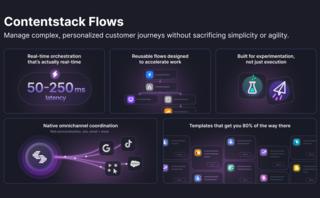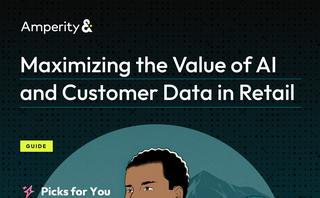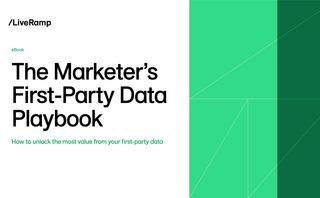303 notes tagged as ["data analytics"]
Filter your results by choosing one or more tags below or type your query in the search field above.
-

Each day, shoppers create enormous amounts of data about themselves, their habits, and their preferences. As a result, supply chains (if leveraged properly) can virtually “talk” to retailers, manufacturers, and shippers.
But none of that data becomes actionable if retailers and their partners can’t get that data to tell a meaningful story. This research aims to find out how well retailers – and their trading partners – are able to convert this data into insight.
-

Whether third-party cookies finally crumble, they are creating compliance headaches—and strategic blind spots—for publishers and marketers. As Bettina Lippisch, Omeda’s VP of Privacy and Data Governance, pointed out during her talk at OX8, cookies are more than tech—they’re potentially capturing a sharing personal data of your site visitors. And the laws are catching up.
“Cookies collect PII. What you looked at, where you went, how long you were there, where you logged in from—it’s all data. And it’s all subject to the same rules.”
-

Understanding your customers is essential for building strong relationships and achieving lasting growth. It’s not just beneficial; it’s fundamental. Building that coveted 360-degree customer view, however, requires a solid foundation. It demands that you master several critical facets of data, insight and action.
Let’s explore the seven pillars of a comprehensive C360, asking the crucial questions that lead to a complete and actionable customer picture.
-
You are currently enjoying the free trial mode which gives only back 3 results for each of your searches.
Click on Reset Search Tags to try another search.
Free NewsletterOnly paid members can get full access to the most recent content, create their own tags & personal folders, assign search results to specific projects and much more… all of this for less than 99c a day.
-

5 Ways AI changed brand-customer relationships forever
“Never be the same again” is 100% a term we would use for brand-customer relationships in the age of AI. New operational models, new types of buyer’s journeys, simplified visual search, and brands being cut out of their own marketing funnels are just some of the fundamental ways Gen AI, voice assistants, chatbots, and AI agents have changed the game forever.
In this article, we’ll dive into 5 significant changes brought on by AI, how they add to the overall customer experience, and whether or not you should rethink your marketing strategy and daily behind-the-scenes operations. Spoiler alert: You definitely should.
-

5 Data-driven ways to personalize your marketing automation flows
Your marketing automation is running perfectly. Emails go out on schedule, campaigns trigger based on user actions, and your dashboard shows decent open rates. Yet something’s off: Conversion rates plateau, customers churn at the same predictable rate, and your campaigns feel increasingly ineffective.
However, the problem doesn’t lie with your automation. It’s that you’re treating all customers like they’re the same person.
-

Maximizing the value of AI and customer data in retail
AI holds massive potential for transforming retail — from driving operational efficiency to enhancing customer experiences. But without the right data foundation, that promise for growth and efficiency turns into risk.
In our latest guide, we highlight how the most competitive retailers are already using AI to improve efficiency, strengthen customer relationships. Brands looking to do the same need to understand the critical connection between clean, unified customer data and AI success.
-

Before AI can help, your customer data needs fixing
We’re in the eye of a storm where three powerful forces are colliding: the explosion of customer data, the rapid advancement of artificial intelligence (AI), and intensifying economic and geopolitical uncertainty.
Economic uncertainty breeds changing consumer behaviors and budget constraints
The explosion of customer data is making it hard to find the right signal
Rapid advancement of AI is allowing brands to more efficiently reach customers
-

The marketer’s first-party data playbook
As a marketer, you already know first-party data, or customer records, is critical to your brand’s success. But did you know your first-party data is key to unlocking true business value – from more accurate campaign reach to developing high-impact audiences and segmentation to driving more personalized experiences?
Check out our Marketer’s First-Party Data Playbook to:
Explore six strategies for reaching more audiences with hyper-personalized content
-

Why real-time data is essential for pricing and promotions
Retailers are confronting significant challenges. Markets shift rapidly, inflation squeezes profit margins, and tariffs change costs. Consumer behavior is equally unpredictable, with viral trends causing sudden demand spikes. Meanwhile, competitors frequently adjust prices and launch promotions to capture shoppers’ attention.
Against this backdrop, real-time data is the cornerstone for successful pricing and promotional strategies. Without it, retailers risk playing constant catch-up, powerless to act against competitors and market forces.
-

Acquire new customers with richer insights using clean rooms
Marketers are struggling with new ways to uncover new customers, but they don’t have to be. Did you know that a data clean room might be the answers to your audience challenges? These data-rich spaces put the power back into the hands of marketers to not only find new customers, but ones who are ready to buy right now. Clean rooms empower marketers to find new in-market customers and then activate on a person-level to reduce ad waste.
-

Discover what’s shaping data and analytics strategies
We surveyed over 3,200 marketers and CX professionals, and 8,000 consumers, to learn about their data management strategies, how they’re using analytics, and what consumers care about most when it comes to how their data is handled. Fragmented data is blocking their ability to deliver real-time, one-to-one personalization. To stay ahead, businesses must unify their data.
Check out the Adobe 2025 AI and Digital Trends: Data and Insights report and learn: